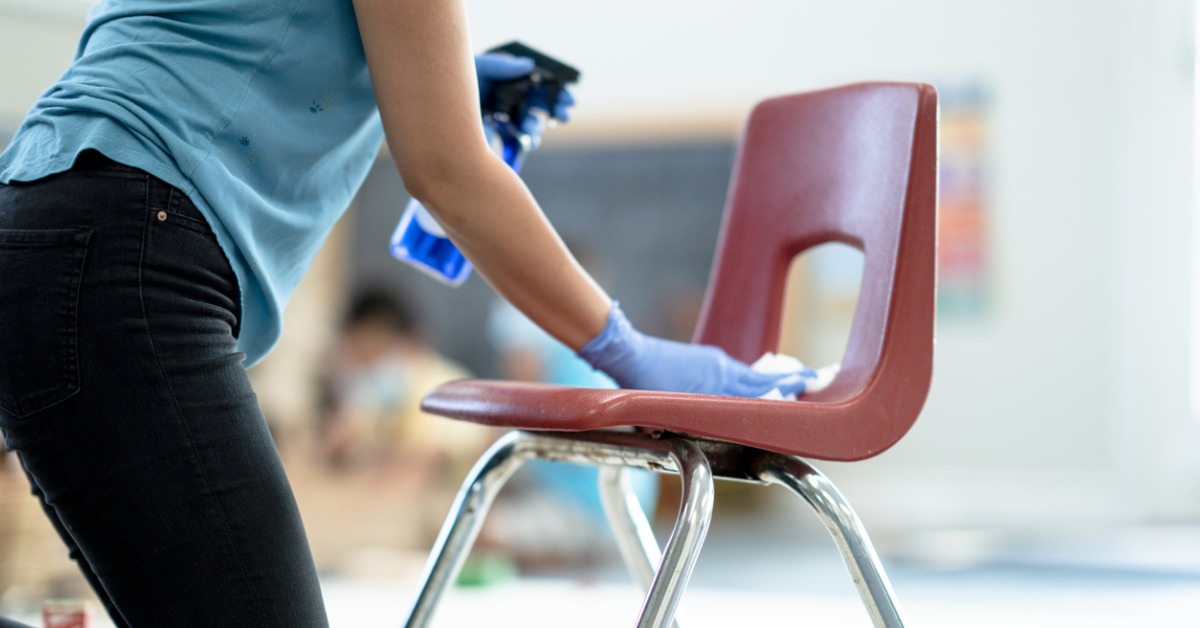
Childcare centres are often referred to as petri dishes for infectious diseases. One child brings a virus or bacteria into the centre and within days, dozens of children, their parents and centre workers can fall ill. Disinfecting surfaces is one of the most important aspects of infection control in a childcare centre and ensuring that an outbreak doesn’t occur.
What Causes Gastro at Childcare Centres?
Norovirus is a type of virus that causes gastroenteritis with symptoms that include vomiting and diarrhoea. The highly contagious virus often causes outbreaks in childcare centres, schools and aged care facilities. Symptoms usually start 1-2 days after exposure and last for 1-3 days. Other possible symptoms include fever, chills, stomach cramps, headache and muscle aches. Rotavirus, astrovirus and adenovirus are other common viruses that cause viral gastroenteritis.
Young children are at greater risk of being infected with gastroenteritis than adults because of their close contact with others and lack of hand hygiene knowledge. Children also frequently put potentially contaminated objects in their mouth and often touch floor surfaces. Parents of infected children then become infected due to close contact with their sick child or from cleaning vomit or faeces spills. Multiple states in Australia reported large gastro outbreaks in late 2021, which affected childcare centres and schools.
Sick children should stay away from childcare centres for at least 48 hours after symptoms cease as they may still be contagious. Some viruses can remain in the stool for up to two weeks after infection, so centre staff should be extra vigilant about hand hygiene, ensure the use of gloves when changing nappies and disinfecting the nappy change station after each child.
How to Kill Gastro Bacteria with Disinfectant
Disinfecting surfaces is essential for stopping the spread to other children who attend the facility. The norovirus can live for up to two weeks on a surface, so effective disinfecting after a child has been sick is important to ensure others don’t become infected.
The difficulty with childcare centres is the high number of surfaces that can harbour the virus. There are plenty of high-touch hard surfaces such as highchairs, tables, chairs, cots, toys, floors, benches, toilets and door handles. There are also a number of soft surfaces that need to be considered, such as the carpet, mats, bedding, toys and clothing.
When cleaning up after a vomit or faeces spill, carers should wear gloves and discard the rag or paper towel in a sealed plastic bag with the gloves before placing the bag in the bin. Wash hands thoroughly with soap under warm running water to remove any trace of the virus.
Childcare staff who prepare food and drinks should be particularly careful of hand hygiene during and after a gastro outbreak to ensure children aren’t infected through contaminated food and water.
Disinfecting Hard Surfaces
When a child with gastro experiences vomiting or diarrhoea, it’s important to disinfect all hard surfaces that have been (or may have been) contaminated. It’s not just the surfaces in the close vicinity of a vomiting episode that are at risk. When a person vomits, the virus can become airborne and land on a surface well away from the spill. Virus particles can also move to other rooms in the centre via hands or toys.
There are many things that need to be considered when it comes to choosing a disinfectant. There is a difference between cleaning and disinfecting, with most disinfectants requiring that a surface be cleaned and left to dry before being applied. The two-step process is very time consuming and expensive for childcare centres. A 2-in-1 disinfectant means each surface only needs to be wiped once, which cuts cleaning time in half. Follow instructions carefully to ensure the solution is left on the surface long enough to kill the bacteria before wiping dry.
Disinfecting Soft Surfaces
Hard surfaces are much easier to disinfect than soft surfaces. Floor rugs, toys, and linen can all harbour gastro-causing bacteria unless they’re adequately disinfected. Machine washing in hot water with the usual laundry detergent is enough to kill the bacteria. For items that can’t be machine washed such as rugs and carpet, steam cleaning or drycleaning will kill any gastro-causing bacteria.
Using Bodily Fluid Spill Kits to Disinfect Surfaces
Chlor-Clean, a hospital-grade disinfectant, can remove any gastro-causing bacteria and viruses, making any hard surface safe. Our bodily fluid spill kits come in a single-use packet that uses Chlor-Clean technology to clean and disinfect surfaces. Once the spill has been handled, our spill kits allow you to contain any equipment, PPE and residue for disposal.
If you would like more information about Chlor-Clean or how our bodily fluid spill kits can help prevent a gastro outbreak at your childcare centre, call 1300 29 32 32 or contact us online.